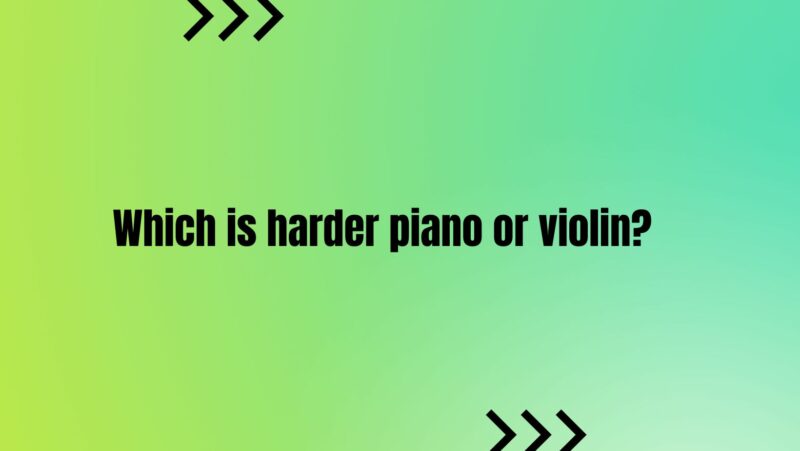The question of whether the piano or violin is harder to learn is a subjective one, as it depends on a number of factors, such as the individual’s natural abilities, learning style, and motivation. However, there are some general factors that can make one instrument more challenging than the other.
The Piano
The piano is a keyboard instrument that is played by striking the keys. This requires less fine motor control than the violin, but it does require a good understanding of music theory and notation. The piano is also a very versatile instrument, which can be used to play a wide variety of music.
The Violin
The violin is a stringed instrument that is played by bowing the strings. This requires a great deal of fine motor control and coordination, as well as good finger strength. The violin is also a very expressive instrument, which requires the player to be able to produce a wide range of sounds.
Which is Harder to Learn?
Ultimately, the question of which instrument is harder to learn is a matter of opinion. However, there are some general factors that can make one instrument more challenging than the other. The violin is a more physically demanding instrument to play, as it requires more fine motor control. The piano is a more intellectually demanding instrument to play, as it requires a good understanding of music theory and notation.
Which Instrument is Right for You?
The best way to decide which instrument is right for you is to try both of them out and see which one you enjoy playing more. If you are not sure where to start, you can take lessons from a qualified teacher. They can help you assess your skills and abilities and recommend the best instrument for you.
Here are some additional factors to consider when choosing an instrument:
- Your age and physical ability: If you are young or have any physical limitations, you may want to choose an instrument that is easier to learn and play.
- Your learning style: If you are a visual learner, you may want to choose an instrument that has a lot of visual cues, such as the piano. If you are an auditory learner, you may want to choose an instrument that has a lot of sound, such as the violin.
- Your goals: What do you want to achieve with your instrument? Do you want to play for fun? Do you want to join a band? Do you want to play professionally?
No matter which instrument you choose, the most important thing is to have fun and enjoy the process of learning. With hard work and dedication, you can achieve your goals and become a skilled musician.
Here are some additional tips for learning the piano or the violin:
- Start with the basics. Learn the names of the notes and how to read music. You can find many resources online or at your local library to help you with this.
- Practice regularly. The more you practice, the better you will become at playing the instrument. Try to practice for at least 30 minutes a day.
- Get feedback from a teacher or friend. If you can, get feedback from a qualified teacher or friend who plays the instrument. This can help you identify and correct mistakes in your playing.
- Don’t be afraid to make mistakes. Everyone makes mistakes when they’re learning something new. The important thing is to learn from your mistakes and keep practicing.
- Celebrate your successes. As you learn and improve, take some time to celebrate your successes. This will help you stay motivated and keep practicing.
Learning to play any instrument takes time and effort, but it is a rewarding experience that can enrich your life. So don’t be afraid to try both the piano and the violin and see which one you enjoy playing more.
Here are some additional things to consider when choosing between the piano and the violin:
- Cost: The piano is typically more expensive than the violin.
- Portability: The piano is not as portable as the violin.
- Space: The piano requires more space than the violin.
- Maintenance: The piano requires more maintenance than the violin.


